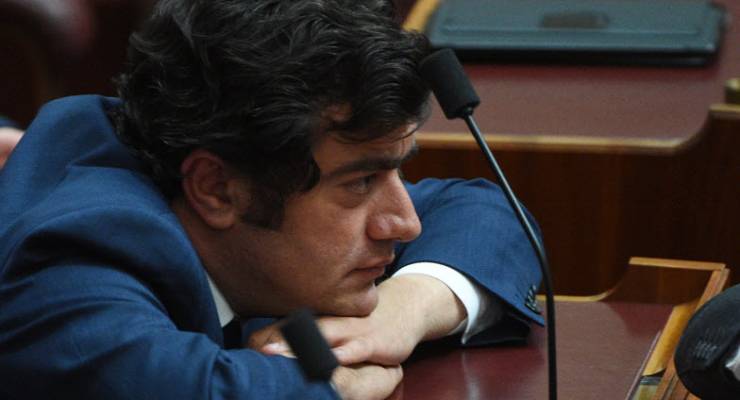
Thanks to the swirling shitstorm that is the Coalition’s civil war over gay marriage, a relatively minor controversy over the questionable rehabilitation of Sam Dastyari disappeared quickly from our screens this week.
The campaign has been underway since Dastyari resigned from the shadow ministry last year over a donation he’d sought to cover a cost over-run in his office. Monday night’s Australian Story puff piece on the former Sussex Street bovver-boy was only the latest move by the “junior senator” to repair his considerably tarnished reputation.
Dastyari has employed two textbook tactics in this endeavour — replacing the controversial name with a human face, and getting ahead of the game.
After the traditional public declaration of regret, the usual next step in piecing together a shattered reputation is to show there’s a flawed but well-intentioned person behind the notoriety.
Labor leader Bill Shorten kicked off that element of the campaign early, saying in a statement on the day of Dastyari’s resignation that the senator had “made a mistake and now he’s paying a heavy price,” but that “Sam is a young bloke with a bright future ahead of him. He has a lot to offer Labor and Australia.”
Well yes, that “young bloke with a bright future” is also a factional powerbroker who was instrumental in the replacement of two former Labor leaders. Dastyari had also been associated with two discussions of a leadership change during Shorten’s four-year tenure — one before Malcolm Turnbull hit the skids, and another after the 2016 election. But never mind.
The analogue approach to humanising Dastyari would have been to move straight to the confession television interview favoured by other “flawed but well-intentioned” celebrities such as Hugh Grant, Tiger Woods, Kanye West and Lance Armstrong.
Streetwise Dastyari initially chose the digital path instead. Using social media to connect with voters in an entertaining fashion, he was rewarded with mostly positive media coverage for the online antics. Even when the traditional media coverage was critical, such as over the controversial “housing affordability” video, Dastyari was the beneficiary — the video has now been viewed over a million times.
However, the offer of a publishing deal gave the senator a chance to try an even more old skool approach to reputation repair than the confession interview. Like most political memoirs, One Halal of a Story will mostly be read by political junkies and the media, but that would suit Dastyari given those people are the target of his reputation management efforts.
[MUP says it didn’t approach Australian Story for Dastyari book promotion]
The book is very well written but ultimately an unsatisfying read, for like any other political memoir it divulges only what Dastyari wants us to know. There are delightful stories of his family and the people who’ve mentored and inspired him over the years, but little sense of the power wielded by Dastyari when he was the second-youngest general secretary of the New South Wales Labor Party, or when he was given the traditional sinecure bestowed upon holders of that position — a seat in the Australian Senate.
Very little is said of the two prime ministers Dastyari helped to roll from his position of power in the NSW right. Of the coup that installed Gillard, Dastyari concedes: “We all still carry scars from that period. No one who was at all involved escaped unscathed. Friendships were destroyed, and people still don’t talk to each other years after the events.”
Nevertheless, Dastyari paints himself as a Rudd man, providing a short homily from the last days of Kevin 2.0 to demonstrate the man’s three dominant personalities (charmer, policy wonk and ruler). There’s also an anecdote on the apparently indefatigable and unfathomably optimistic Bill Shorten, who has a “dogged determination to work” and an “unrelenting force of personality that keeps propelling him forward, regardless of the obstacle ahead”.
From this we are to take that Dastyari is a loyal and humble servant of the party’s great men, even though political history shows he’s a ruthless faction man who’d throw anyone under a bus if it meant winning office.
That’s why the senator has taken an additional step to repair his reputation by trying to get ahead of the game on political donations.
It was only a small and legal — if not whiffy — donation that led to Dastyari’s short stint on the backbench (he’s already been promoted again, this time to deputy opposition whip in the Senate). However a number of other donations have emerged that raise questions about the influence of foreign donors, in particular, on Dastyari and the Labor Party more broadly.
Shanghai Sam’s tactic to neutralise himself against any further revelations of questionable donations has been to declare himself a sinner who has seen the light — taking on the hair shirt of a reformed political bagman. After Dastyari first got pinged for getting a donor with foreign interests to pay his excess travel bill, his party tried to shift to the high moral ground by calling for a ban on foreign donations.
But this week the senator upped the ante, telling Australian Story on Monday night that political donations should be banned altogether:
“I come at this from someone who wasn’t just part of the arms race … I was one of the weapon suppliers in this arms race … and responsible for fundraising across the party. It needs to come to an end, and the time for that is now.”
Dastyari would have suggested this safe in the knowledge that it would never happen — for a start, it’s unconstitutional. And even if a way were found around the constitution, any scaled-down campaign run by a financially depleted Labor Party would be balanced with an increase in the campaign activity of cashed-up unions. Dasher’s call for a ban is a transparent and no-risk ploy to convince the media and voters that he’s reformed.
[Five pieces of government business that are actually about Sam Dastyari]
Of course, none of this should be at all surprising. Dastyari makes no secret in his book of the two legendary Labor strategists who influence his everyday thinking and behaviour: his father-in-law Peter Barron, and the former NSW Labor head-kicker Graham Richardson.
Dastyari describes Barron as Bob Hawke and Neville Wran’s fixer, and a wordsmith for Hawke, Wran and Paul Keating. “I talk to my father-in-law twice a day,” he confesses, “I lap up his advice; I listen carefully to what he says — I’d be nuts not to.”
He’s equally effusive about his other mentor, Richo, who backed Dastyari’s move to the Senate even when it was being resisted by Paul Keating and Bob Carr because they wanted him to stay in Sussex Street to repair NSW Labor:
“This is the man who made Bob Hawke; the man who, with John Ducker, drove the support behind Neville Wran; the man who paved the way for Paul Keating … Richardson radicalised Labor policy, was the subject of a thousand stories, was the greatest show in politics.”
The campaign being waged to rehabilitate Dastyari both within and outside Labor bears the fingerprints of the two legendary strategists, just as much as it is distinguished by Dasher’s manic flair.
What is equally clear is that Dastyari’s fall from grace was a fairly brutal awakening for the young bovver-boy.
Reflecting on the experience in the book, Dastyari claims to have learnt how much perception matters in politics. “Once your actions are painted in a particular way, and once the speculation begins about what precisely motivated you to do what you did, it becomes very difficult to defend yourself,” he writes. “If you are widely perceived to have acted in an improper way, your honesty will be questioned and, ultimately, your standing will be tarnished.”
The Senator concludes the parable with a timeless warning:
“It doesn’t matter how high you are flying, you cannot afford to think that you can’t do wrong. If you don’t think about the consequences of your actions, you will let people down. These are the lessons that have been driven home to me.”
It is too early to tell whether this is simply rehabilitation-campaign rhetoric. Only young Sam’s future behaviour will prove whether he has truly taken the lesson to heart.








Keep flogging that expired, rodent-shaped horse-like object, Paula. We might not laugh so loudly at your judgment…nah, we will.
“If you are widely perceived to have acted in an improper way, your honesty will be questioned and, ultimately, your standing will be tarnished.” Shanghai Sam’s quote from above. Shades of his mentor ‘Richo’ being forced to resign his ministry position in ’92, for allegedly using his influence to help a cousin charged for forgery. Or more recently, Arthur Sinodinos’ involvement in the dirty Eddie Obeid (another pollie) saga. What a rich brew of (alleged) corruption we put up with in our politicians. ICAC could be the answer.
Absolutely need a Federal ICAC.
I was inclined to look benignly on Sam Dastyari until:
1. The arrogance of assuming foreign donors would pick up his bill.
2. Finding out just now that G Richardson was a “mentor”. It was this same GR who led me to change from an ALP voter to s Greens voter. When I read that his retirement from politics was a chance to “get seriously rich”, I realised how the idealism of Labor had died.
The people whose votes decide elections have never heard of him.
Lucky them.
How is it possible that Mini Mr Bean can be a power broker – is the ALP really so bereft of talent that he is not laughed out of any room wherein he squeaks?
Typical gumBoil Shlernt, learned his zinger, “Sam is a young bloke with a bright future ahead of him.” by rote and delivered it with his usual tin ear for authenticity – would that be as distinct from behind him?
With a turncoat, divisive menace merchant like Richardson as a mentor, how long before Shanghai starts sending out the heavies to persuade potential Peter Baldwins to toe the line?
The party began rotting from the day Hawke was elected and this creature is a perfect example of what it has become.